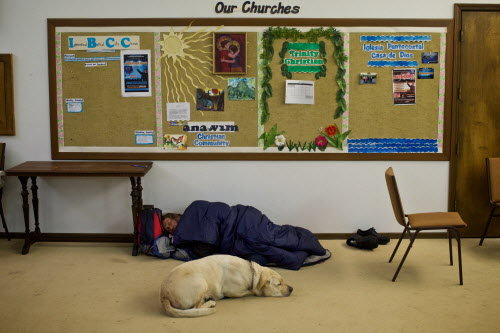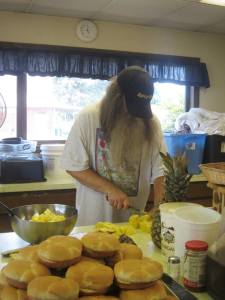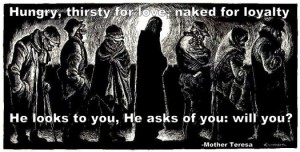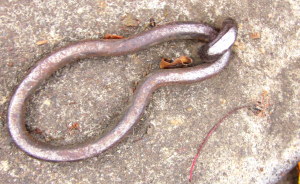-
Three Reasons for Poverty?
This is a guest post by Nigel Branken, who, with his family, ministers to the poor in South Africa. He speaks out against the continuing prejudice against the coloreds in that country, and lives out his convictions by assisting people and helping them through the courts.
Nigel offers us some great wisdom:
3 arguments that I constantly hear about the reasons people are poor…
- People are poor because they are stupid;
- People are poor because they are lazy;
- People are poor because there is just not enough in the world for everyone.
You hear it presented like this…
- The solution to poverty is education,
- If people work harder they can break out of poverty
- If we want to deal with poverty we need to grow the economy mostly through entrepreneurship and job creation.
While all of the above, education, hard work, entrepreneurship, job creation and economic growth are all good and help in some way, these arguments ignore and sustain the main reasons we have such obscene levels of poverty namely the greed of the ultra rich, their success being dependent on an exploitable work force, together with all of our combined apathy and acceptance of the status quo.
Not having an education is used as a justification to exploit people and pay them less than what is required to live with any dignity. “If they were more educated they would be paid higher wages” is just another way of saying “I have employed you because I can get you at a super cheap price and make massive profits from you.”
The hardest working people I know are the poorest. They work long hours for 6/7 days a week while never being able to afford a holiday. Their companies strictly control and limit their lunch and tea breaks. They are kept at maximum production levels on the brink of exhaustion for as long as they can be productive and are often churned out and replaced as soon as their productiveness ceases to be helpful.
Growth in the economy hardly ever translates into a reduction in poverty as most new wealth goes to the already rich. This is why inequality globally is growing not shrinking. The ultra rich keep taking more and using that more to demand more from the poor. Job creation programmes which pay minimum wages hardly ever translate into a real reduction in poverty. Entrepreneurship, despite being spoken of as a solution is also not encouraged in reality. The rich do not really want the poor to start their own businesses. Limited access to capital and excessive regulations at the entry level normally provide sufficient barriers to entry so the majority are kept without an escape route from poverty, thereby maintaining an available exploitable work force for the ultra rich.
If you look at the ultra rich, it is hardly ever their hard work, education or the growth of the economy that has led to their riches. Their riches are normally built on the backs of the poor. They are dependent on the poor. In addition, the rules are stacked in their favor and there is also a combination of luck, opportunity, and connectedness.
Perhaps the most revealing reason these arguments are used is because they require nothing or very little from the ultra rich. The responsibility for poverty is placed in the hands of government or the exploited themselves.
When you suggest that perhaps there could be a little more even distribution of profits you are labelled a communist, a socialist, a leftie or a liberal. You are told that only free market capitalism works despite the fact that there is very little freedom in the markets. The rules favor those who have already made it.
No current political party will be able to deliver the change we need. Most political parties have already been captured by the ultra wealthy. Our governments have already mostly been bough and act in the interests of a few. We are already mostly oligarchies. The change which is required will take a grassroots movement of active citizens who are not only fed up with the status quo, but also prepared to work for change.
If we are going to move towards a more just world, we need to dream while we are awake and actively pursue our dream by demonstrating it is possible around us and advocating for structural change.
Here is my starting statement towards the world we as a family dream of… Perhaps you can add yours below…
“We are a rather ordinary family doing some extraordinary things. We believe as Christians that God is extremely concerned with the brokenness in our city and nation and that He has called each one of us to get involved in making a difference. To bring change, we need to see the future, prepare for the future and then become the future… or in the words of Ghandi “we must become the change we want to see in the world”.
We want to see a world in which the rich do not tolerate extreme poverty and inequality. We want to see many people actually laying down their lives of comfort and convenience for the sake of bettering the lives of others. Seeing people freed from poverty, inequality, racism and exploitation is more important than fulfilling our lust for more things! We want to be part of a society in which people are valued more than things. We want to see the god of consumerism in South Africa bowing it’s knee to a love motivated revolution which results in freedom from oppression and exploitation. We want to see this for all people, regardless of class, citizenship, race or religion.
We dream of equality in every sector of society. We believe that if the education system is not OK for a rich kid, it is not OK for a poor kid. The same goes with healthcare, housing, security. The same goes for rural kids and inner city kids. The same for black kids and white kids. We are not more valuable than the least valued in our society. We are doing our lives in a new way.
We are going to live our dream and see this reality briefly described above happening around us. We hope others will join us and this will happen around them too. Who knows, very soon, the world can be a different place!
-
Kindness Creates Kindness
 I note that there are many, many people who fear the homeless. This is because they don’t recognize that the homeless are their neighbors. Sure, we have some irritating neighbors, even bad ones, but as long as we are polite to our neighbors, they will be polite to us. If we are kind to them, they will be kind to us. Here’s some ideas to be a neighbor to the homeless:
I note that there are many, many people who fear the homeless. This is because they don’t recognize that the homeless are their neighbors. Sure, we have some irritating neighbors, even bad ones, but as long as we are polite to our neighbors, they will be polite to us. If we are kind to them, they will be kind to us. Here’s some ideas to be a neighbor to the homeless:- If you see a new homeless person in your neighborhood, offer them a cup of coffee
- Ask them how they are doing each time you see them
- Talk about neighborhood issues—traffic, local news, new buildings, etc.
- If they look unhappy, ask them why
- If you have an issue with them (trash, perhaps), go and talk to them. Don’t force the police to mediate for you.
- Once you get to know them, and are comfortable, invite them to dinner. It’s fun!
- If they offer you food or help, please take it. It gives them respect, and you might very well need the help.
-
-
Tough Love
 Marcine grew up abused by her father. She left home early, got a job and worked hard. Someone had lied about her and so she lost that job. The stress of her life was too overwhelming, so she sat in her apartment, unable to seek another job. “They won’t hire me because I was fired from my last job.” Soon she was evicted. She wouldn’t go home to her father, so she was homeless.
Marcine grew up abused by her father. She left home early, got a job and worked hard. Someone had lied about her and so she lost that job. The stress of her life was too overwhelming, so she sat in her apartment, unable to seek another job. “They won’t hire me because I was fired from my last job.” Soon she was evicted. She wouldn’t go home to her father, so she was homeless.She went to a local church and obtained a tent, a sleeping bag and a tarp. A homeless man showed her a safe place to stay. She didn’t feel safe, so she got a boyfriend who would protect her. After a while, when his trauma showed through, he would beat her. She left him with her tent and sleeping bag, leaving her only with a blanket.
She slept in a park, under a bench. She stayed there all day except when there was a meal going on. She had no energy to do anything. A neighbor found her and said, “You are so lazy! Look at the trash under the bench! Get up and find a job!” She rolled over and stayed under the table.
The first neighbor told a second that there was a homeless person under the park table. The second said, “But there are children that play in that park! Homeless people use drugs! And are thieves! This person is dangerous!” And they called the police.The police came over and looked at her under the table. There wasn’t much trash there, just a small pile. There were no needles, and one empty beer can. But she couldn’t stay there. “This is a park. You aren’t allowed to stay here.” She was so exhausted, she ignored him. “Ma’am, you will have to leave. Now.” She just laid there. “If you don’t get up, I’ll have no choice but to arrest you.” In the end, that’s what he did. Arrested her for trespassing on city property. As he was driving her in, he said, “I hope this teaches you a lesson. You are a good girl. You just need some tough love.”
Ninety-five percent of all homeless men have experienced trauma and PTSD. One hundred percent of all homeless women have experienced trauma. The homeless have experienced enough tough love. They need solutions.
Marcine isn’t a real person, but all that happened to her really happened to homeless people I know.
-
Balancing
 Tim was an alcoholic, but through support and a job he stopped drinking. He lost his job and ended up on the street, but he determined that he wouldn’t go back to alcohol as a “solution” to his problems. His friends all drank, and constantly offered him some, but he refused.
Tim was an alcoholic, but through support and a job he stopped drinking. He lost his job and ended up on the street, but he determined that he wouldn’t go back to alcohol as a “solution” to his problems. His friends all drank, and constantly offered him some, but he refused.One day, he was in a park and he saw his sister with her children playing by the swings. He walked away from his homeless friends and waved at her, giving her his sweet smile. She saw Tim, immediately gathered up his niece and nephew, and walked quickly to her car, leaving before he could catch up to them. Tim walked back to his alcoholic friend, pointed at his bottle of vodka and said, “Here, give me that,” and drank it all down.
As Tim drank for years after that, his health deteriorated severely. His blood pressure was so high that doctors were stunned that he was still alive. He would spend a week at a time in the hospital. To save his life, a pastor friend of his asked him to stay in his house. Tim wasn’t sure that he wanted to, because he knew that to live in the pastor’s house was to stop drinking and he wasn’t sure he was ready to. But his homeless friends encouraged him, even demanded that he stay in the house. No one wanted him to die on the streets.
Tim agreed. He moved in, traded his beer for Mountain Dew, and he regained his health. He volunteered at the church and encouraged his friends. He relapsed a few times, but he remained sober until he died three years later of his heart giving out.
Life is a balancing act. Some are acrobats and can balance on their own. Most of us need friends and supporters to hold our hands in order to keep our balance.
3733 N Williams Ave
Portland, OR 97227
503.888.4453
AnawimCC@gmail.com
Ministry Locations and Times »
Recent Posts from Anawim
-
Workshop on Helping the Homeless
Below... -
Conversation about Springwater Corridor
Amanda... -
Changes
I... -
The Cause of Homelessness
Marie... -
-
What is Homelessness?
Mark... -
Bad News
I’m... -
Everybody Needs a Little Help…
This... -
God’s Listening
I... -
Moving Day
This...












